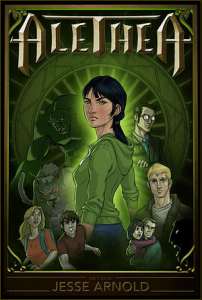
Nobody ever said growing up was easy.
In general, Alethea by Jesse Arnold is a quintessentially ‘young adult’ fare, focusing on the ordinary life-turned-extraordinary of a teenage girl. Despite this usual set-up, it’s happily devoid of the popular stereotypes perpetuated by many of the top sellers of recent years. The book is genuinely rather realistic and unflinching in its descriptions of the lives and personalities of its not-entirely-likable characters.
Sixteen-year-old Alethea is vain, over-accomplished and decidedly bitter, and she doesn’t hide it. Her friends are shallow, her parents are work-obsessed, and she’s surrounded by people with an eye for results over happiness wherever there’s ever an overlap. However, they’re never shown as two-dimensional cut-outs to prove some jaded teenage viewpoint, instead real people who aren’t perfect and don’t need to be. There’s a reason for everyone being how they are and they’re not in a position to change as long as everything’s working right now, even when things start to change drastically and slide into the fantastic, for the most part. From able gymnast to trying to find a way to use the bathroom without embarrassment to reluctant defender against the supernaturally malign, Alethea maintains a dry, unashamedly teenage view of the situation that if nothing else crutches the emotions she has yet to learn how to handle, in a palpable way.
If John Green rewrote Buffy, Alethea might have had a kindred spirit – at least for part of the book. While starting rather typically, things become far more disturbing with time and the fever dream of reality begins to shudder and twist in dangerous ways. In a way the genre itself lends to the plot’s eventual shift and the style of writing and characterization slots into later questions about previous events. It’s well-planned, but very alive.
The book isn’t without its issues. The editing, especially during early chapters, leaves behind sentences that seem to skip a word or line-break where it would be expected, making verbal double-takes a little more frequent than they should be. The book also goes from cynically heartbreaking to genuinely dark, terrifying and potentially upsetting over time, and more sensitive readers shouldn’t feel ashamed about checking this book’s reviews before delving into a pretty disturbing text. Physical and mental trauma are a significant part of the book’s theme, and while it handles those with understanding, it doesn’t hold back. The biggest twists in plot and tone alike aren’t easily predicted from the start, for better or worse, but if the first chapters are denser than expected, the reader won’t find themselves over the hump any time soon.
Alethea is strange and surreal and yet all-too-familiar as a recognizable experience of teenage trauma in a world of conspiracy and darker things best left unquestioned. It’s a solid, mind-bending read for the more mature reader in touch with their cynical teenage side. A great idea well explored, and with an especially fantastic cover that totally wins my vote. A work that deserves to be picked up by those with a particularly intrepid mind.
Review Overview
Design
Content
Editing
Get an Editorial Review | Get Amazon Sales & Reviews | Get Edited | Get Beta Readers | Enter the SPR Book Awards | Other Marketing Services






















Leave A Comment